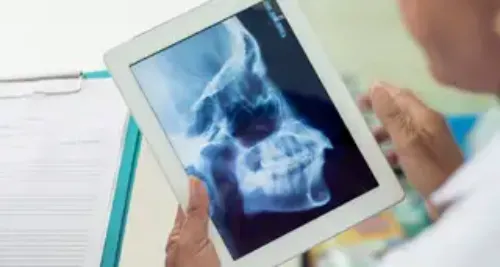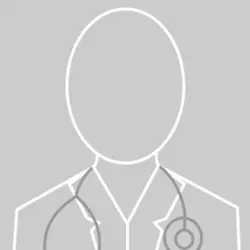Temporomandibular joint dysfunction
"The joint pathology is possibly one of the most complex in the facial territory. Therefore, treatment by different specialists may be necessary in a coordinated manner".
DR. JUAN JOSÉ GAITE
CODIRECTOR. DENTAL UNIT

The diseases of the temporomandibular joint are caused by an alteration of the elements (teeth, gums, jaw, maxilla, temporomandibular joint, muscles ...) that make up the masticatory system, which breaks the balance and forces others to adapt to change.
The Clinica Universidad de Navarra has a unit specialized in the diagnosis and treatment of temporomandibular joint (TMJ) problems and orofacial pain.
For their treatment, the coordinated participation of different specialists may be necessary. Thus, along with oral and maxillofacial surgeons, the Pain Unit, rehabilitation doctors and physiotherapists specialized in orofacial pain intervene.
The blockage of the temporomandibular joint is a relatively frequent problem and, on many occasions, it is solved with a relatively simple intervention called arthrocentesis.

What are the symptoms of TMJ Disorder?
The masticatory system may be working irregularly for a long time without any symptoms appearing.
However, when the balance of the system is broken, the following symptoms may appear:
- Clicking or other noises when opening or closing the mouth.
- Limitation of oral opening. Patients find it difficult to open their mouths. This may be related to pain that causes the opening to be forced or because the jaw cannot be moved at all and the joint is completely stiff.
- Orofacial pain.
The most common symptoms are:
- Snaps when opening or closing the mouth.
- Limitation of oral opening.
- Orofacial pain (head, ear, jaw).
Do you have any of these symptoms?
You may have temporomandibular joint dysfunction
How is temporomandibular joint dysfunction diagnosed?

The masticatory system is composed of the teeth, the jaw joint and the masticatory muscles that work together to achieve adequate mastication.
The balance of this system is delicate and, if any of its elements does not work properly, the other two adapt to compensate for the deficient state. In case our organism is not able to adapt properly, a craniomandibular dysfunction is originated.
The way in which the teeth fit together is usually responsible for the appearance of this dysfunction. A bad dental occlusion can force the joint to move inadequately to chew or cause the teeth to grind at night.
Cone beam scanning, MRI, diagnostic arthroscopy and PET studies are used to make the diagnosis.
How is TMJ dysfunction treated?
Depending on the diagnosis and severity of the problem, the treatment will be different:
Hygienic and dietary measures
In some cases, the dysfunctions can be solved with a series of advice and care that the patient himself will be able to carry out, such as knowledge of the joint movements that should be avoided.
Occlusal splints
Most cases have an occlusal problem, so the correction would be made by means of splints that the patient would wear fitted to his teeth. It fulfills the function of muscle relaxation and jaw repositioning. They are used at night.
Surgical procedures
- The blockage of the temporomandibular joint, in many cases, is solved with a relatively simple intervention called arthrocentesis.
- In some patients with complex problems, it may be necessary to surgically approach the joint through arthroscopy. This technique is indicated when the patient presents limitation of the mouth opening and has a pain that does not yield with analgesics or with the discharge splint. Through a camera, which is introduced into the joint, the different parts that make up the joint are observed and, if there is any alteration that could cause the discomfort, it is properly corrected.
Where do we treat it?
IN NAVARRE AND MADRID
The Dental Unit
at the Clínica Universidad de Navarra
The Clínica Universidad de Navarra has extensive experience in rehabilitation with dental implants, with highly satisfactory results for patients and professionals.
In order to achieve better care for complex patients or those with risk factors which may influence safety during the intervention, we work together with the different medical services of the Clinica: Cardiology, Endocrinology, Allergology, Pediatrics, Speech Therapy, etc.
Diseases we treat
- Dental abscess
- Cavities
- Periodontal disease
- Loss of teeth
- Dental pain
- Malocclusions
Treatments we perform
- Dental Implants
- Orthodontics
- Dental surgery
- Endodontics
- Fixed dental prosthesis on teeth and implants
- Removable prosthesis
- Cleaning and teaching of oral hygiene
- Pediatric dentistry

Why at the Clinica?
- Safety and comfort in our treatments while being in a hospital.
- Equipped with the best technology on the market.
- Multidisciplinary work with the rest of the specialists of the Clínica.




